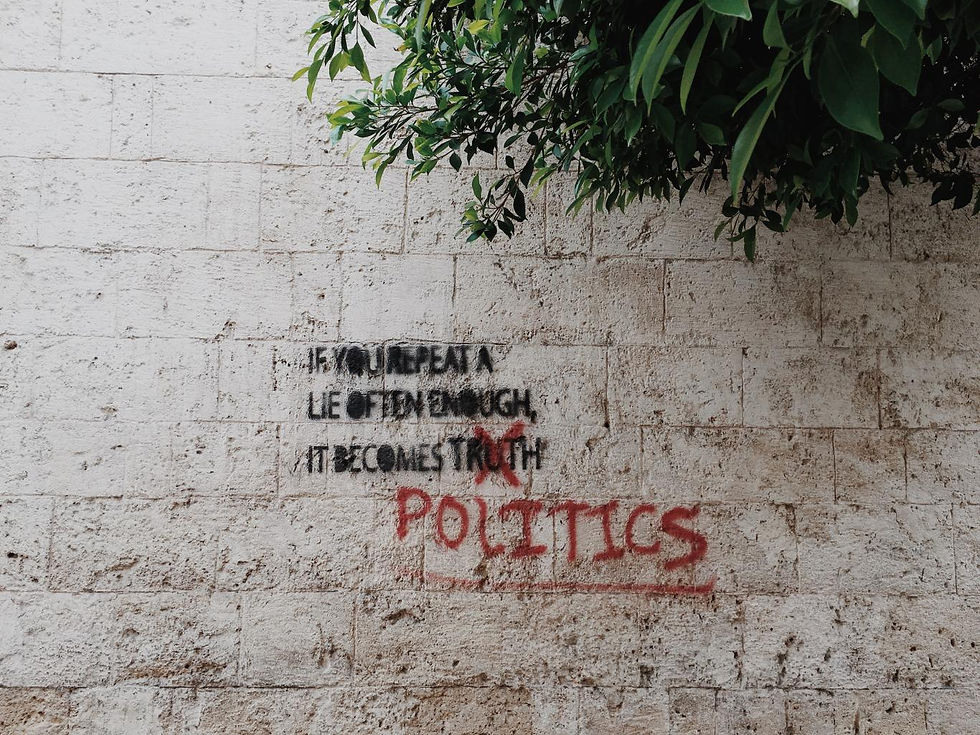LOBBYING: A SOUGHT AFTER CAREER AND CELEBRATED WAY OF LIFE?
- rebecca46125
- Apr 29, 2023
- 3 min read

Over the last few months, the role of lobbyists and ‘special advisers’ have been called into question, with numerous accusations of cronyism and secrecy in relation to policy influence, and government procurement and hiring. The lack of holistic transparency in the current system is resulting in public mistrust and is routed in the narrow definition of lobbying that is applied in the UK's regulatory framework. Both professional bodies in this sector, the CIPR & PRCA, are calling for change and they're well-placed to develop a pragmatic solution. I have a voice is proud to be announcing a partnership with the CIPR today as it publishes the findings of research that supports its long-held position that the lobbying register should be expanded to capture all lobbying activity.
"As someone who is a proud ‘lobbyist’ in a professional and personal capacity, working hard to promote the value of our profession, the recent spate of scandals is alarming and demoralising. We have to change. We have to do better." Rebecca, IHAV
The dictionary defines lobbying as any attempt to influence the decisions of government. Many of us do this each and every day – that is the benefit of living in a democratic society. Democratic processes should facilitate a two-way dialogue between government and citizens to inform its decisions. Lobbying allows people to have their say.
Lobbyists exist across business, the charity and public sectors, social action groups and civil society. Lobbyists play a crucial role in making sure that different voices are represented to government. We should be proud to showcase when and how we’ve informed and influenced government decision making in the interests of those we represent.
At its essence, surely it would be beneficial to have greater transparency around how often decision-makers are meeting with different representatives and how this influences:
their policy decisions
who is hired, and
who is awarded government contracts.
You can (or at least I can) follow the logic that this would encourage those being lobbied (this is a two-way street) to ensure that they spend a proportionate amount of time with different groups of representatives. This could go some way to levelling the playing field between those with large ‘lobbying’ budgets and those with more modest means, those with existing connections and those who are less well connected, because it would mean we could assess whether the government were being lobbied by people with a breadth of experience, expertise and views – or not.
The CIPR’s study shows that most people agree groups should be able to meet with policymakers to promote ideas and influence public policy. Suggesting it is the system that is broken, rather than a vehement opposition to the act of lobbying. The CIPR & PRCA are well-placed to work through what changes should be made to the current system. The PRCA's open letter to Government outlines some of these measures.
Most of us who came into this profession did so because we want to make a positive contribution. There is a lot of value in lobbyists bringing a range of expertise and perspectives to the government. But we need to be transparent about what we’re doing, who with and to what end - this will lead to a better understanding of what we do.
Another potential significant positive impact from I have a voice’s perspective is that a check on any real or perceived ‘cronyism’ could help us to attract and retain talent from a wider range of backgrounds into ‘lobbying’ – because representation becomes increasingly important versus a reliance on existing networks.
I have a voice is a social enterprise that works with young people in communities whose voices are under-represented in political discourse. We use professional expertise to equip them with the tools and confidence to understand politics and engage with democratic processes and lobby to get their voices heard.
Photo by Brian Wertheim on Unsplash

I return after my shift at the construction site in Manchester and open https://king-kong-cash.org.uk/ — everything here is for us, in pounds, no hassle. With my hands covered in cement dust, I spin the slots with this funny gorilla, as if I were having a smoke break with the guys in the shed. Not for the big wins, but just to give my head a break from the noise of the jackhammers.
My husband is a programmer and spends all day writing code. In the evenings, Koi Spins Casino saves him. Yesterday, he was excitedly showing me their new slot with floating carp the colors are so delicate that they really calm your nerves after a day at work. He was particularly touched by how, during the bonus round, the goldfish start dancing to Asian melodies he says it even makes his breathing slow down. I've noticed that after half an hour of playing at Koi Spins Casino, he seems reborn the tension in his shoulders disappears and his ability to joke returns. For him, it has become a ritual of cleansing from work stress, something like meditation with Japanese gardens. Althoug…
A couple of days ago, I tried Win Diggers, and I've been visiting it regularly ever since. I logged in, played, and there were no glitches. I play on my mobile, and everything runs smoothly! If you're tired of fancy websites with tons of ads, this is like a breath of fresh air.
I had a free evening and randomly opened Lucky Barry at first I thought I would just take a look but the games actually kept me entertained for a while. I liked the smooth design and the slots were colourful enough to make it fun. Even the card tables felt easy to follow. For people in the UK who curious it could be a surprisingly calm way to spend some time.